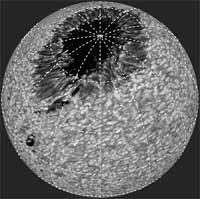Star trick with stains

Around a sun-like star, astronomers detected in 1998 a planet the size of Jupiter. In general, they are studying the light emitted by these planets. The wavelength of this light shifts to red and blue as a result of orbit, so the study of the light received on Earth allows to calculate the distance to which it is and its mass. About 70 planets have already been found outside the Solar System.
In the surroundings of the star HD 166435 of the constellation of Hercules this light is received. The Geneva observatory analyzed this light and concluded that it came from a planet. Now, American astronomers have discovered that HD 166435 is a young and active star and that some surface areas of the star are cooler than others. This makes the star look "stains" and, due to the rotation movement, emits a spectrum of light as if it had a planet around it. According to recent studies, therefore, what was supposedly a new planet are nothing more than the stains of the star.





